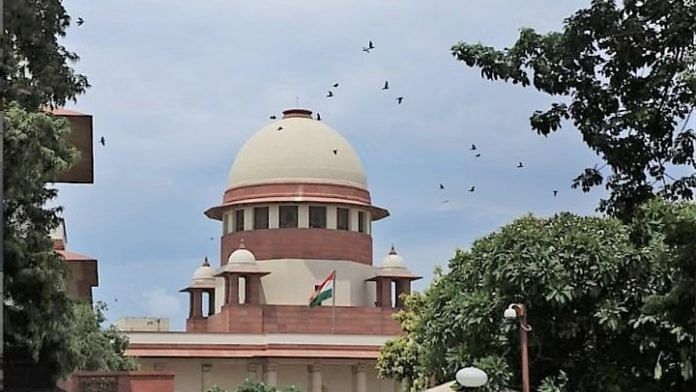New Delhi: The Supreme Court (SC) — in a move that could bring respite to over 22,000 flat buyers who invested money in now-insolvent Jaypee Infratech Limited’s (JIL) housing projects — will likely examine the validity of an Income Tax (I-T) department assessment order that raised a claim for Rs 33,000 crore from JIL in liabilities.
The assets and liabilities of JIL, which had been facing insolvency proceedings since 2017, were transferred to Suraksha Realty Limited and Lakshdeep Investments and Finance Private Limited in March 2023 under a resolution plan, which also cut the I-T department claim to Rs 10 lakh.
However, in September 2023, the I-T department appealed to the National Company Law Appellate Tribunal (NCLAT), which upheld its Rs 33,000-crore claim. After that, Suraksha, Lakshdeep, and the monitoring committee overseeing the resolution plan appealed against the NCLAT order in the SC. Their appeals claimed the Rs 33,000 crore could be a hurdle in their efforts to execute the resolution plan and delay the construction of flats.
On 15 April this year, a bench of justices Sanjiv Khanna and Dipankar Datta, taking note of the concerns raised, indicated that the top court, in the interest of the flat buyers, might take the rare step of using its extraordinary powers under Article 142 of the Constitution to determine whether the I-T department’s claim is valid.
Before doing so, the SC asked the Central Board of Direct Taxes (CBDT) to look into whether the I-T department’s claim was justified. It asked the CBDT chairperson to examine all aspects and issues raised and file an affidavit in the matter within 25 days.
The bench made it clear that its move was due to the “very peculiar facts and circumstances of the case” — the resolution plan for a housing project that affects thousands of flat buyers is at a “standstill” over the JIL’s liabilities, transferred to Suraksha and Lakshdeep now.
Under the Insolvency and Bankruptcy Code (IBC) proceedings initiated against Jaypee in 2017, a Committee of Creditors (CoC) first accepted a resolution plan by Suraksha-Lakshdeep in 2021 after much back and forth. Two years later, the National Company law Tribunal (NCLT) gave it final approval. The resolution plan admitted Rs 23,083 crore liabilities of JIL, accrued due to failure to pay back secured creditors, including flat buyers.
When the resolution deliberations started in 2017, the I-T department said JIL owed it Rs 1,100 crore from 2011-12. It added Rs 3,000 crore towards JIL’s annual earnings over the next 36 years — the concession period in a deal between JIL and UP administration for land transfer for Yamuna Expressway construction and surrounding area development. Given the additional income, the I-T department fixed JIL’s liabilities at Rs 33,000 crore.
The IT department filed its claim in March 2017 during the first round of resolution proceedings but did not file any in the second round, initiated afresh under a 2018 SC order. This led the resolution plan to slash the claim to Rs 10 lakh back in 2021 only. Upon being served the plan, the IT department did not file any objections to it. When the NCLT finalised the resolution plan in March 2023, the I-T department approached the NCLAT.
The NCLAT, in September 2023, raised a future liability vis-à-vis the companies taking over JIL as yearly dues and noted that the I-T commissioner crystalised the amount through its March 2017 order.
During the hearing Monday, lawyers for the two companies and the monitoring committee said the NCLAT cannot interfere with the commercial outlay of a resolution plan. The lawyers also submitted that NCLAT erred by not appreciating that a resolution plan is based on a detailed account of the assets and liabilities of the corporate debtor, JIL, in this case.
The appeals mentioned that the IT department fell in the category of operational creditor and secured creditors (with security interest over JIL’s assets) would get precedence. Once approved, added the appeals, the resolution plan is binding on all stakeholders and checks any past claims, like the I-T department’s, from resurging.
(Edited by Madhurita Goswami)



